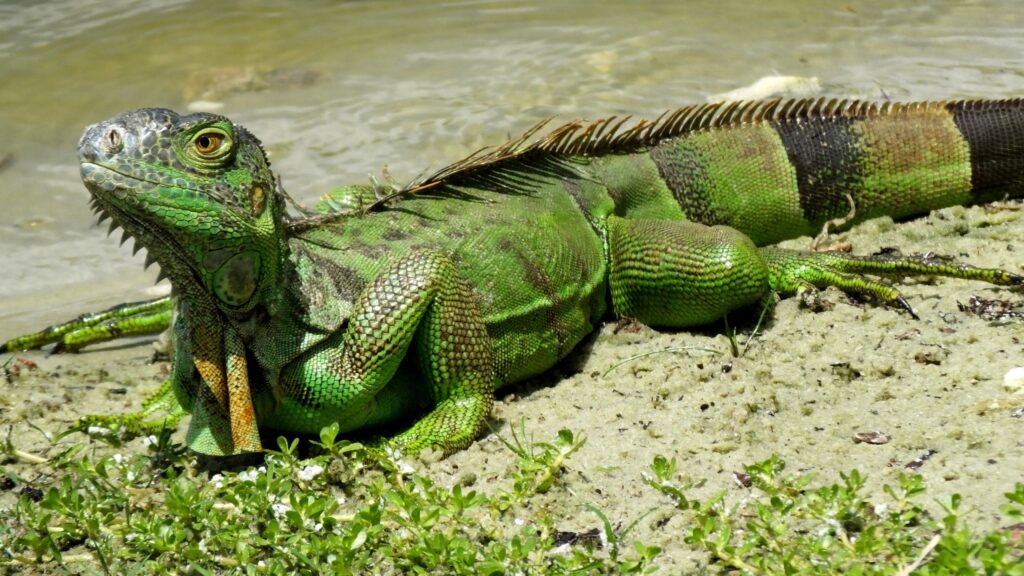Introduction
Florida’s warm climate makes it an ideal habitat for iguanas, particularly during their breeding season. If you’re asking when do iguanas lay eggs in Florida, this will provide detailed insights into their reproductive habits. As experts from Iguana Busters, we will explore the timing, locations, and frequency of iguana egg-laying, as well as other interesting facts about these reptiles.
Do Iguanas Lay Eggs?
Do iguanas lay eggs? Yes, iguanas are oviparous, meaning they lay eggs rather than giving birth to live young. Female iguanas typically lay a large number of eggs in a single clutch, ranging from 20 to 70 eggs depending on the species and the size of the female. This reproductive strategy helps ensure the survival of some offspring, given the numerous predators and environmental challenges they face.
Understanding the reproductive habits of iguanas is essential for managing their populations, particularly in areas where they are considered invasive. When do iguanas lay eggs in Florida? The timing of egg-laying can vary based on environmental conditions, which we will touch on in the next section.
Timing and Frequency of Egg-Laying
When do iguanas lay eggs in Florida? In Florida, iguanas typically lay their eggs during the warmer months, with the peak breeding season occurring from late spring to early summer. This period provides the optimal temperature and conditions for egg incubation and hatchling survival. The exact timing can vary depending on factors such as weather patterns and the availability of suitable nesting sites.
How many times a year do iguanas lay eggs? Most iguanas in Florida lay eggs once a year, although in some cases, they may lay two clutches if environmental conditions are favorable. The frequency and success of egg-laying can be influenced by the female’s health, age, and access to resources. Monitoring and managing iguana populations during these critical periods can help control their numbers and mitigate their impact on local ecosystems.
Where Do Iguanas Lay Their Eggs?
Where do iguanas lay their eggs? Female iguanas prefer to lay their eggs in warm, sunny locations with loose, well-drained soil. Iguanas dig burrows to create nests where they can deposit their eggs, ensuring they are protected from predators and environmental extremes. These nests are often found in gardens, yards, and other landscaped areas, leading to significant disruption and damage.
The prevalence of iguanas in Florida has led to various efforts to control their population. For instance, residents are encouraged to humanely kill iguanas to reduce their impact on local ecosystems. Do iguanas eat squirrels? No, iguanas are primarily herbivores and do not typically prey on small animals like squirrels. However, their presence can still be problematic for local wildlife and vegetation. Do iguanas eat bugs? Occasionally, iguanas may consume insects, but their diet mainly consists of plant material.
The impact of iguanas in Florida is significant, with damages sometimes leading to expensive repairs. In West Palm Beach, iguanas contributed to an $1.8 million repair bill due to the extensive damage they caused.
At Iguana Busters, we specialize in identifying and managing iguana nesting sites to prevent further damage to your property. Our humane removal techniques ensure that both the iguanas and their nests are dealt with effectively and responsibly, contact us today for a free estimate.
Frequently Asked Questions
Yes, female iguanas lay a large number of eggs in a single clutch.
No, iguanas are primarily herbivores and do not typically eat squirrels.
Iguanas lay their eggs in burrows they dig in warm, sunny locations with loose, well-drained soil.
Most iguanas lay eggs once a year, though some may lay two clutches if conditions are favorable.
While primarily herbivores, iguanas may occasionally consume insects.
Conclusion
Now you know the answer to the question, when do iguanas lay eggs in Florida along with their nesting habits which is crucial for managing their populations effectively. At Iguana Busters, we offer expert solutions to control and remove iguanas from your property, ensuring they do not cause further damage. Our team is knowledgeable about iguana behavior and equipped with humane techniques to handle these invasive reptiles.
If you’re dealing with iguana-related issues, whether it’s their nesting habits or other disruptive behaviors, Iguana Busters can provide the expertise and solutions you need. Contact us today to learn more about our services and how we can help you maintain a safe and iguana-free environment.
In conclusion, managing iguana populations requires understanding their reproductive cycles, nesting behaviors, and dietary preferences. By taking proactive measures and seeking professional assistance, you can protect your property and contribute to the control of this invasive species.


